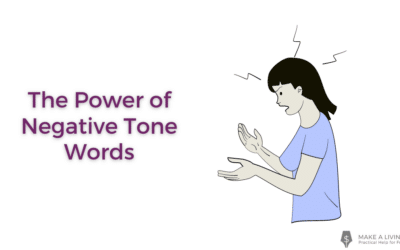What’s that famous book The Elements of Style all about? It’s pretty simple…concise writing.
But how often do you read content that isn’t concise? You know…
- Unnecessary words
- Verbose or formal language and word choices
- Massive paragraphs
- A labor-intensive experience for the reader
Concise writing doesn’t look like this. Why? Every word counts. There’s limited time to keep your reader engaged.
Yet, there are many-and I do mean many-writers who make these mistakes. The mistakes of stretching and theorizing and telling every trivial detail before getting to the point.
Know what I’m talking about?
If you want to be taken seriously as a writer, get an editor’s attention, or attract fans, readers, and followers, concise writing will help you make it happen.
Think of it this way:
Concise writing is the first grace of style which no writer can ignore if he/she wants to be read and taken seriously.
So how do you strip away the grammar-rules that prevent concise writing, create great content, and serve your readers better? Here’s what you need to know:
Meet author and freelance writer Farhan Musavi

Farhan Musavi
Farhan Musavi started freelancing in 2011 when a friend introduced him to creating content to drive traffic and generate revenue.
Since then, he’s written for The Huffington Post, Lifehacker, Problogger, and many other publications.
He’s also the author of Concision: A No-Grammar Guide to Good Writing.
The trouble with too many words
Wordiness in writing is a distraction from your core ideas.
It will bore, confuse, and frustrate your reader.
Here’s how I explain this in my book:
Use five words to say something which can be said in four, and you’ll see your readers leave in favor of a better writer.
Don’t confuse concise writing with absolute brevity
A sentence of six words is brief. If you can rephrase it to say the same thing in four, it’s not concise.
A very long sentence of 60 words is anything but brief. But if you can’t condense it into any fewer words, it is concise writing.
Concise writing doesn’t mean removing necessary details
Instead, it’s using fewer words to report those details. Every word counts. Every word matters.
For example: The seven volumes (and 4,000 pages) of Harry Potter novels written by J.K. Rowling, don’t bore readers. But in contrast, a single, poorly-written page can.
Want to see how it’s done? Check out these four tips for concise writing:
1. Don’t state the obvious
Many amateur freelancers write words which the reader can understand or infer on his/her own.
They often do this either to fulfill the word count assigned by an editor or think the reader will be impressed with long-form content.
Example 1
- Wordy: You see if you have an idea which can benefit or help a lot of people then no force on earth or heavens can stop it from becoming popular. (29 words)
- Concise: Ideas worth spreading, spread. (4 words). You see is not needed. The writer could have started the sentence from if.
Not all ideas that become popular fall into the category of being beneficial or helpful
The idea could be entertaining or instructive or shattering a famous worldview or sitting in any other category for that matter.
- So saying benefit or help a lot of people is somewhat misleading.
- The phrase no force on earth or heavens can stop it seems to have been borrowed from a children’s fantasy novel.
2. Avoid filler words
Old-school SEO writing was the worst for filler words and content just to reach a predetermined word count. Fortunately, that’s changing. But there’s still a lot of poorly-written content out there stuffed with keywords and fluff.
Some books are like this too, with long, rambling passages, that don’t provide information or help move the reader along. Here’s two examples:
Example 1
- Wordy: First and foremost I would like to state that in my opinion our education policy needs a revival. (18 words)
- Concise: Firstly, our education policy needs revision. (6 words)
Example 2
- Wordy: What methodology can I implement to get more true fan base for free of cost? (15 words)
- Concise: How can I get more fans for free? (8 words)
3. Eliminate ‘that’ whenever possible
In my opinion, the word that is one of the most unnecessarily overused words in the English language.
Don’t get me wrong. There are situations where the word should be used.
For example in the following sentences, that is important:
- Zodiac is that kind of film which Hollywood makes once in a decade.
- Exercising at 4 a.m. wasn’t that bad.
However, that could be removed from a lot of sentences without compromising on meaning. Here’s a couple of examples:
Example 1
- Wordy: I decided that I will go watch a movie that night.
- Concise: I decided I will go watch a movie that night. (Note: The second use of that still makes sense.)
Example 2
- Wordy: He said that his father is in the police.
- Concise: He said his father is a police officer.
See how easy that is? No wait…eliminate that. It’s easy.
4. Don’t explain what readers already know
Explaining something the reader already knows results in wordiness. But you have to really know your target audience to make this work.
Example 1
- Wordy: I won’t opt for general relativity, but instead I shall opt for quantum electrodynamics, which is the study of how light interacts with matter at the subatomic scale. (28 words)
- Concise: I won’t opt for general relativity, but instead I shall opt for quantum electrodynamics. (14 words)
A reader who understand the theory of general relativity would also know what quantum electrodynamics is. So the latter term doesn’t need to be defined.
Think about it this way:
Whether or not to define something depends on the target readership
If you’re writing for the layman, then you have to define both the terms general relativity and quantum electrodynamics. If your readers know physics, then there is no need to define either.
Also, the phrase, instead I shall opt, can be deleted without any loss of meaning to make the sentence even better, like this:
Concise: I won’t opt for general relativity, but for quantum electrodynamics. (10 words)
Use concise writing to reach editors and readers
If you’re trying to connect with editors and marketing directors, concise writing can help you write better pitch letters and queries. And if you’re trying to connect with more readers, concise writing can help you there, too.
The bottom line…In our fast-paced, information-driven world, concise writing can help you reach more people, move up, and earn more.
What are your tips for concise writing? Share in the comment section below.
Farhan Musavi is the author of Concision: A No-Grammar Guide to Good Writing (it’s FREE for a limited time). He’s also written for The Huffington Post, Lifehacker, and other publications.












